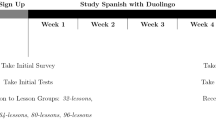An increasing proportion of public expenditures on higher education are devoted to distance learning. This provokes an obvious public policy question—How well does distance learning work? This study addresses that question by means of a large sample, control group study of undergraduate and graduate student success in university distance learning courses. Student success is measured by the grade assigned to the student by his/her faculty member. Gender, age, ethnic background, distance learning experience, experience with the institution providing the instruction and measures of academic aptitude and previous academic success are statistically significant determinants of student success. Similarly, faculty characteristics such as gender, age, ethnic background and education background are statistically significant predictors of student success, though not necessarily in the manner some might hypothesize.
Similar content being viewed by others
References
Berge, Zane L.; Mrozowski, Susan. “Review of Research in Distance Education, 1990 to 1999,” American Journal of Distance Education, 15, 3, 2001, pp. 5–46.
Christ, Carl. “Assessing Applied Econometric Results,” Federal Reserve Bank of St. Louis Review, 75, 2, 1995, pp. 71–94.
Chronicle of Higher Education. The Chronicle of Higher Education: Almanac, 52, August 26, 2005. p. 11.
Dille, Brian; Mezack, Michael. “Identifying Predictors of High Risk Among Community College Telecourse Students.” American Journal of Distance Education, 5, 1, 1991, pp. 24–35.
Friedman, Milton; Schwartz, Anna J. “Alternative Approaches to Analyzing Economic Data,” American Economic Review, 81, March 1991, pp. 39–49.
Koch, James V. “How Women Actually Perform in Distance Education,” Chronicle of Higher Education, 45, September 11, 1998, p. A60.
—. “Does Distance Learning Work? A Large Sample, Control Group Study of Student Success in Distance Learning,” E-JIST: E-Journal of Instructional Science and Technology, 8, 1, 2005. www.usq.edu.au/electpub/e-jist/
Machtmes, Krisanna; Asher, J. William. “A Meta-Analysis of the Effectiveness of Telecourses in Distance Education,” American Journal of Distance Education, 14, 1, 2000, pp. 27–46.
Maushak, Nancy J.; Chen, Hui-Hui; Martin, Laura; Shaw, Benny C., Jr.; Unfred, David. “Distance Education: Looking Beyond ‘No Significant Difference,’” Quarterly Review of Distance Education, 2, 2, 2001, pp. 119–140.
National Center for Education Statistics. Profile of Undergraduates in U.S. Postsecondary Educational Institutions: 1999–2000. Washington, DC: U.S. Department of Education, Office of Education Research, NCES 2002–168, 2002.
Oxford, Rebecca; Park-Oh, Young; Ito, Sukero; Sumrall, Mallena. “Factors Affecting Achievement in a Satellite-Delivered Japanese Language Program,” American Journal of Distance Education, 7, 1, 1993, pp. 11–25.
Saba, Farhad. “Research in Distance Education: A Status Report,” International Review of Research in Open and Distance Learning, 1, June 2000, pp. 1–9.
Shoichet, Catherine E. “Reports of Grade Inflation May Be Inflated, Study Finds,” Chronicle of Higher Education, 48, July 12, 2002, p. A37.
Tomek, William G. “Confirmation and Replication in Empirical Econometrics: A Step Toward Improved Scholarship,” American Journal of Agricultural Economics, 75, October 1993, pp. 6–14.
Whittington, L. Alfons. Factors Impacting on the Success of Distance Education Students of the University of the West Indies: A Review of the Literature, University of the West Indies, Cave Hill Campus, Barbados, 1995.




